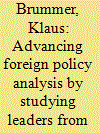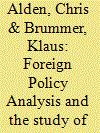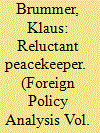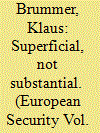|
|
|
Sort Order |
|
|
|
Items / Page
|
|
|
|
|
|
|
| Srl | Item |
| 1 |
ID:
180832


|
|
|
|
|
| Summary/Abstract |
Using the concept of ‘context sensitivity’ as organizing theme, this article explores different avenues of advancing foreign policy analysis (FPA) scholarship based on insights from the global South. Since foreign policy decision-makers in the global South operate in (at times very) different political environments than their western counterparts, the applicability of FPA approaches cannot be taken as a given, which is why their context sensitivity (i.e., the extent to which core concepts and indicators contained in those approaches travel to non-western settings) needs to be explored. This article suggests that our understanding of the motives and behaviours of individual decision-makers can be advanced in three distinct ways based on insights from the global South. First, several of the FPA constructs that focus on individual decision makers have seen hardly any applications to non-western cases, which is why the latter contributes to ascertaining the analytical scope of those constructs. Second, taking more fully into account the differences in decision-making environments within which leaders from the global South operate can advance leader-oriented FPA approaches by helping to specify certain theoretical assumptions proposed by them. Finally, the aspiration to analyse leaders from the global South can advance FPA in terms of method by, for instance, developing non-English language coding schemes for profiling leaders based on speech acts that are cognizant of the specificities of individual languages, while at the same time allowing for measurement equivalence across different languages.
|
|
|
|
|
|
|
|
|
|
|
|
|
|
|
|
| 2 |
ID:
140280


|
|
|
|
|
| Summary/Abstract |
One of the shortcomings of foreign policy role theory is its tendency to black-box the state. Role theorists often assume a national role conception, without paying too much attention to the domestic political processes regarding how a role is selected to represent the state out of a number of potential competing roles. We develop a model of role contestation and role selection that draws on existing knowledge of foreign policy creation resulting from competition between governing elites and opposition, multi-party coalitions, cabinet dynamics, and bureaucratic politics. We incorporate expectations from role theory to explain how conflict over role selection may be resolved. The model is examined in light of several cases in immediate post-war Germany. We find that government and opposition dynamics are the primary sources of contestation over NRCs in our cases, some evidence for bureaucratic politics, and little evidence that coalition politics was at play. Finally, there were few instances in which role conflict resolution mechanisms were used.
|
|
|
|
|
|
|
|
|
|
|
|
|
|
|
|
| 3 |
ID:
170894


|
|
|
|
|
| Summary/Abstract |
This article proposes that the study of Indian foreign policy and Foreign Policy Analysis (FPA) offers a “win-win situation” for scholarship. On the one hand, this bridge-building exercise leads to a better understanding of the making and substance of Indian foreign policy. On the other hand, it advances FPA in both theoretical and empirical terms, thus contributing to overcoming FPA’s US/Western bias and to decentering the field more generally. Framing the argument in terms of levels of analysis, we offer specific contributions to the understanding of foreign policy in areas such as leadership traits, poliheuristic theory, coalition politics, and state-society influences. Moreover, this line of research suggests the contours of a new comparative foreign policy agenda which could emerge from this examination of Indian foreign policy.
|
|
|
|
|
|
|
|
|
|
|
|
|
|
|
|
| 4 |
ID:
119670


|
|
|
|
|
| Publication |
2013.
|
| Summary/Abstract |
This article addresses the ambiguity of the governmental politics model (GPM) concerning the selection of policy options by political actors. It argues that the GPM's core proposition in this respect ("Where you stand depends on where you sit") can be conceptualized by integrating its substantive claims into the two-stage process of the poliheuristic theory of decision making (PH). This is accomplished through the introduction of a "noncompensatory organizational loss aversion variable" in the first stage of PH, according to which decision makers reject all options that are unacceptable for their organization irrespective of their benefits in other decision-making dimensions. In the second stage, the decision makers scrutinize the remaining options more thoroughly with respect to several decision dimensions, including organizational interests. This article uses Germany's decision to participate in EUFOR RD Congo, a military operation of the European Union in the Democratic Republic of Congo (DRC), to probe the plausibility of the revised GPM.
|
|
|
|
|
|
|
|
|
|
|
|
|
|
|
|
| 5 |
ID:
079727


|
|
|
|
|
| Publication |
2007.
|
| Summary/Abstract |
Surveys such as the European Commission's Eurobarometer regularly reveal high levels of public support for European Security and Defence Policy (ESDP). This paper argues, however, that public support for ESDP is only superficial, not substantial. First, there is no homogeneous 'European' public support for ESDP. Second, security and defence, as covered by ESDP with its focus on global crisis-management, rank very low among Europeans' priorities. Third, Europeans are very sceptical about the appropriateness of military means, and hence a core element of ESDP, as a legitimate instrument in international affairs. These reservations are likely to have constraining effects on ESDP's future development. At the same time, there are compelling reasons for the further development of ESDP. Therefore, Europe's political elites should initiate a public diplomacy campaign inside the EU in which the case for Europe's further evolution as a strategic security and defence actor is made. ESDP operations are the most promising starting points as they illustrate both the normative and the 'realist' necessities of European engagement in global security affairs
|
|
|
|
|
|
|
|
|
|
|
|
|
|
|
|
|
|
|
|
|